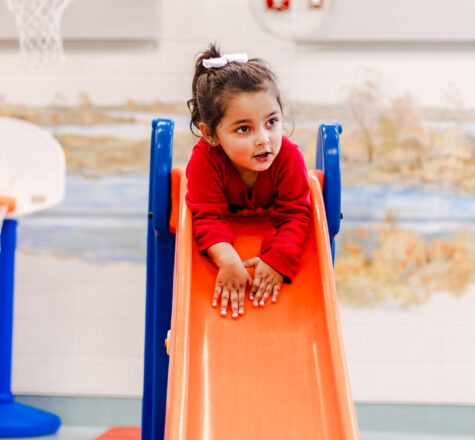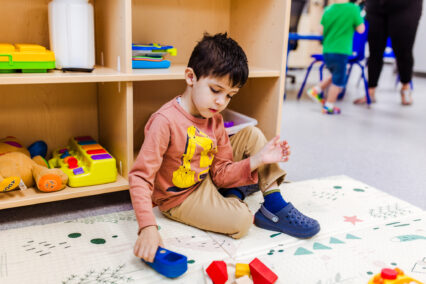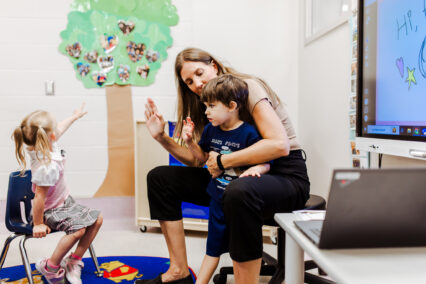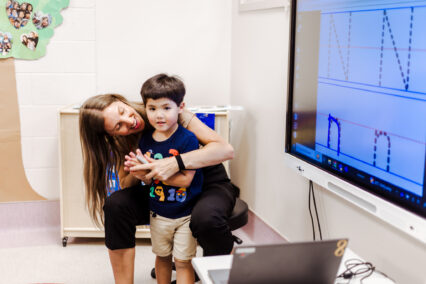At KidsAbility, our Occupational Therapists (OTs) help children and youth with various physical, cognitive, and developmental disabilities or delays that impede daily activities that are important and meaningful to them and their families. Whether it’s getting dressed, playing with friends, or even learning to use tools for schoolwork, we’re here to make these activities easier and more enjoyable.
Occupational Therapists look at the:
- Person – the child’s physical and cognitive skills and the stage of their development
- Environment – the physical set up of the environment (i.e., home, childcare, school, etc.) and social supports
- Activity (occupation) – the daily task or activity that they want or need to do
Assessment
Once an assessment is complete, the OT will work with you to identify why your child may be having trouble with an activity or task. They will make suggestions to support skill development or task modifications to promote independence and participation. OTs can make changes to activities, provide equipment when needed, and change or adapt environments and routines to make activities easier.
The OT will work closely with the child and their caregiver to ensure there is a good understanding of the child’s unique needs and provide strategies that will help better support the child in the child’s natural environments.
What Service Looks Like
We work closely with children/youth and their caregivers to provide support with skills and activities such as:
- Self-Care Skills: daily skills required for everyday life
- Dressing
- Feeding and eating
- Sleeping
- Using the washroom and toileting
- Bathing and personal hygiene
- Mobility and safety at home, community, and school
- Productivity Skills: skills that are important for playing and learning
- Fine motor skills
- Participating in daily routines
- Sensory processing and self-regulation
- Eye Hand Co-ordination
- Play and Leisure Activities: skills that contribute to play and socializing with friends
- How a child plays and interacts with toys and tools
- How a child develops their motor and coordination skills for recreational activities
- How a child socializes and engages with others
Once an assessment is complete, the OT will work with you to identify why your child may be having trouble with an activity or task. They will make suggestions to support skill development or task modifications to promote independence and participation.
OTs can make changes to activities, provide equipment when needed, and change or adapt environments and routines to make activities easier. The OT will work closely with the child and their caregiver to ensure there is a good understanding of the child’s unique needs and provide strategies that will help better support the child in the child’s natural environments.
Who benefits from OT services
We provide our services to children with various conditions, including:
- Developmental delays and disabilities
- Cognitive, emotional, and sensory challenges
- Medical, surgical, and orthopaedic conditions
- Physical disabilities (e.g., spina bifida)
- Neurological conditions (e.g., cerebral palsy)
- Musculoskeletal conditions (e.g., congenital amputations or upper extremity deformities)
We recommend considering a referral to KidsAbility for Occupational Therapy if your child:
- Appears “stiff” or “floppy”
- They have difficulty with grasping, reaching, or holding objects
- Mealtimes and feeding are a challenge
- Sensory sensitivities affect their daily life
- They struggle with self-regulation
- They exhibit unusual reactions to sensory input
- They have delayed gross or fine motor development
- Self-care skills are a concern
- There are difficulties with play, peer interactions, or attention to tasks
Milestones
- Random arm movements
- Reflexive hand to mouth contact in side-lying
- Strong grasp reflex
- Hands open as arms stretch out
- Briefly retains object placed in hand
- Reflexive scratching and clutching of blanket
- Head turns and eyes fixate on the hand of an outstretched arm
- Purposeful reach and swipe with arms
- Begins to reach forward and with both arms
- Strong hand-to-mouth pattern
- Can reach while on belly without losing balance
- Consistent, purposeful reach with vision guiding
- Transfers object from hand to hand
- Finder feeds biscuit/bread stick
- Consistent grasps with palm
- Shakes and bangs toys
- Reaches in all directions
- Plays using arms
- Pokes with index finger
- Rakes tiny object with fingers
- Grasps with the thumb side of the hand
- Releases objects in space and into large container
- Assists with cup and food feeding
- Finger feeds greater variety of food sizes and shapes
- Grasps using thumb and next two finger
- Pincer grasp with pad of thumb and index finger at 10 months
- Pincer with tip of thumb and index finger at 12 months
- Places one block on top of another without balancing
- Removes socks, finger feeding and cup drinking improve
- Imitates adult’s use of tools (brushing hair)
- Uses hands to push, pull squeeze, rotate
- Bands two cubes held in each hand
- Points with index finger
- Places many objects into a container without removingany
- Places round piece, then square piece, then triangle into form board
- Places tiny objects in small mouth container
- Uses both hands together at middle of body
- Stakes 2-6 cube tower
- Scribbles spontaneously
- Imitates a vertical stroke
- Imitates a circular stroke
- Stacks tower of 9-10 blocks
- Imitates a 4 block design
- Folds and creases paper
- Completes 3-8 piece inset puzzle
- Strings small beads
- Holds pencil with thumb and fingers
- Imitates, then copies a cross
- Draws a 2 part person
- Grossly colors one image on page and attemts to stay within lines
- Uses scissors to cut forward on a thick line (6x ¼ inch)
- Snaps clothing
- Uses spoon and fork with little to no spilling
- Imitates a 4-6 block design
- Laces sewing card
- Copies diagonla line
- Imitates a square or triangle
- Imitates an X
- Draws a 3 part person
- Buttons front opening clothing
- Opens all fasteners
- Uses scissors to cut out a circle, square, and triangle
- Builds complex structures with Legos, Tinker Toys or similar toys
- Completes 10-25 piece puzzle
- Copies a triangle
- Imitates, then copies a rectangle
- Connects two dots with a straight line
- Colours numerous small areas with attention to accuraracy and colour
- Uses scissors to cut out simple, then complex figures
- Draws simple picture
- Ties laces into a bow
- Cuts soft food with a safety knife



